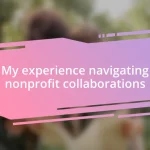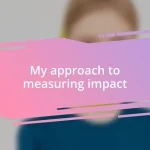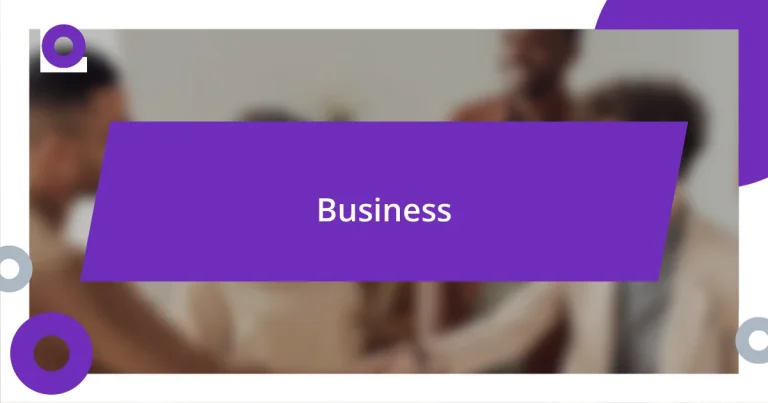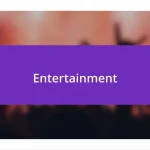Key takeaways:
- Identifying specific learning objectives enhances focus and clarity, turning vague goals into actionable steps.
- Utilizing the SMART framework for goal-setting provides structure, making aspirations measurable, achievable, and time-bound.
- Regularly tracking progress and celebrating achievements fosters motivation and sustained commitment to the learning journey.
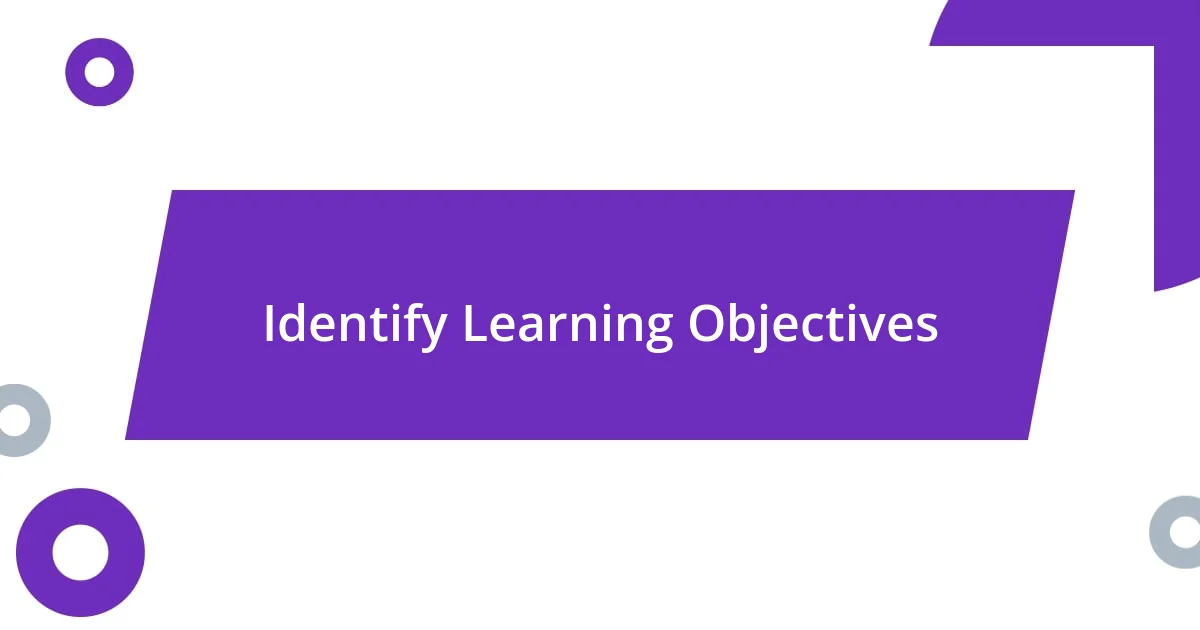
Identify Learning Objectives
Identifying learning objectives is the cornerstone of a productive educational journey. I remember when I first started outlining my goals; it felt overwhelming. But then I asked myself, “What do I genuinely want to achieve?” This question really helped me narrow my focus.
Once, while preparing for a new certification, I sat down with a notebook and jotted down everything I wanted to learn. I found that breaking my objectives into smaller, actionable steps made them more manageable. It’s like breaking down a recipe into individual ingredients; each ingredient serves a unique purpose in creating the final dish.
I also learned the importance of being specific. Instead of saying, “I want to improve my writing,” I refined it to “I want to reduce my passive voice usage by 50% in my next few articles.” This clarity transformed how I approached my learning and provided me with clear milestones to celebrate along the way. Have you tried being that specific with your objectives? It’s a game-changer!
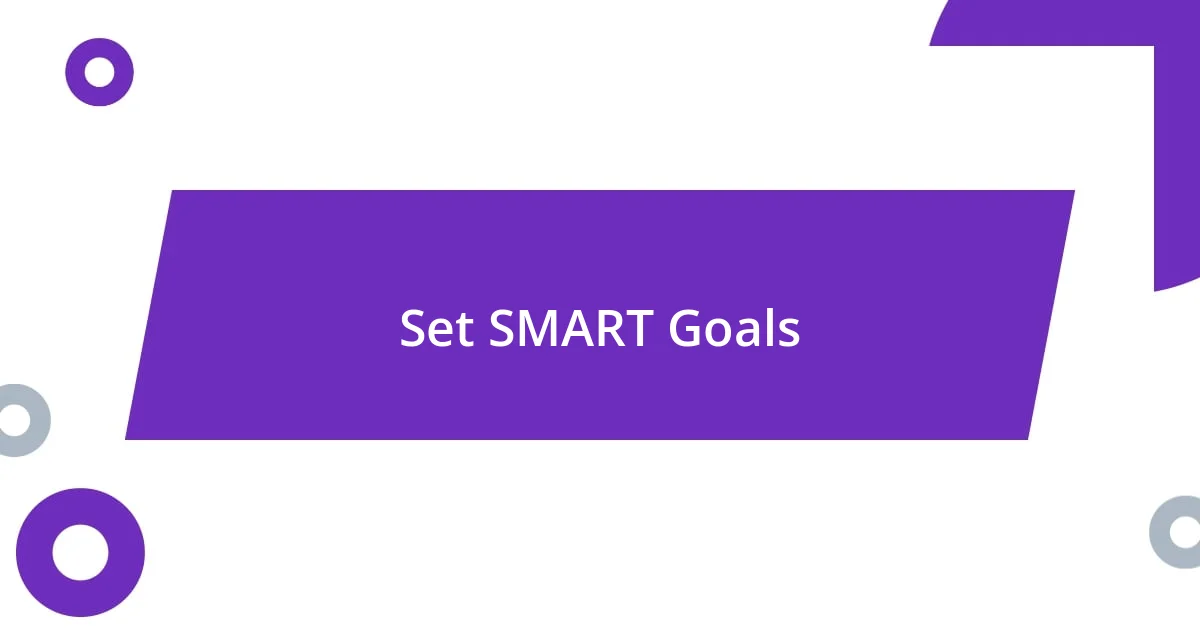
Set SMART Goals
Setting SMART goals is essential for turning vague aspirations into tangible achievements. I remember the first time I learned about the SMART framework—I was skeptical at first, but applying it really made a difference. Each component, from specificity to time-bound deadlines, helps give structure to my ambitions.
- Specific: Clearly define what you want to accomplish. For instance, “I want to master Excel for data analysis” is more focused than just saying, “I want to learn Excel.”
- Measurable: Create criteria for tracking your progress. I recall setting a goal to complete one Excel tutorial per week—it made it easy to see how far I’d come.
- Achievable: Consider if your goals are realistic given your current circumstances. I once aimed too high by planning to learn three software programs at once; it led to frustration rather than progress.
- Relevant: Ensure that your goals align with your broader objectives. For me, learning Excel directly connected to my career advancement, which kept me motivated.
- Time-bound: Set a deadline to create urgency. I’ve found that having a clear target date pushes me to stay accountable and committed.
The clarity that comes with SMART goals is empowering. I often look back at my past achievements, and every single one stemmed from a well-structured goal, helping me navigate the chaos of my learning journey.
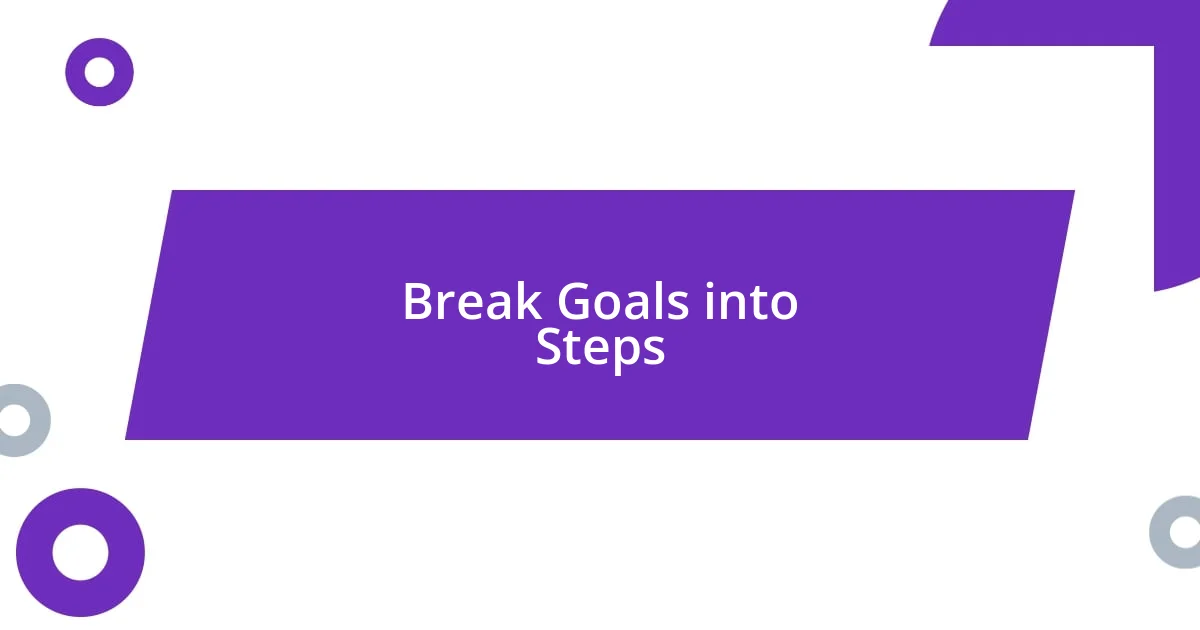
Break Goals into Steps
Breaking goals into steps is a practical approach that can truly shift your learning experience. I recall a time when I wanted to learn a new programming language. Instead of diving headfirst into complex projects, I listed down what tools and concepts I needed to grasp first, like understanding syntax and basic data structures. By tackling them one by one, I found that my confidence grew steadily, much like stacking building blocks—each piece adding to the structure.
I’ve often seen how daunting larger goals can become if not divided into manageable parts. When I aimed to improve my public speaking skills, I created smaller, achievable steps: starting with crafting an outline for my first speech, practicing in front of a mirror, and gradually working up to presenting in front of friends. This incremental approach turned what seemed like an enormous task into a series of small victories, allowing me to conquer my anxiety along the way.
One effective method I’ve adopted is using a timeline to visualize my goals. For instance, I charted out my steps for creating an online course, breaking it down into phases like research, content creation, and marketing. By marking deadlines for each step, not only did I stay on track, but I also celebrated each phase as a little success. It was energizing to see progress in real-time. How do you keep your learning goals organized? It can make all the difference in maintaining momentum.
| Step | Description |
|---|---|
| Identify Key Concepts | List down the fundamental ideas or skills you need to learn. |
| Set Small Milestones | Create mini-goals within each concept to celebrate progress. |
| Establish a Timeline | Visualize when each step should be completed to maintain accountability. |
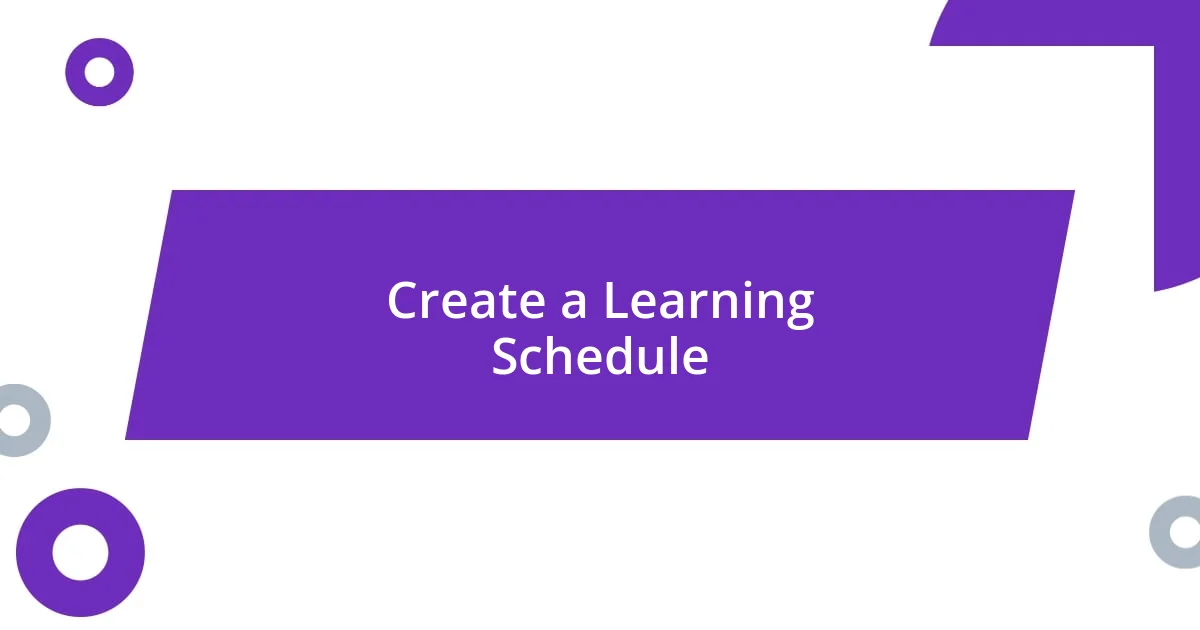
Create a Learning Schedule
Creating a learning schedule is one of the most impactful strategies I’ve discovered in my journey toward mastering new skills. When I decided to learn digital marketing, I realized that without a schedule, my goals would likely end up scattered and unachievable. So, I set aside specific time blocks in my week, treating them like important appointments. This commitment not only ensured that I dedicated time to learning but also instilled a sense of discipline in my routine. Have you ever felt like time slips away without you noticing? A structured schedule eliminates that concern.
It’s also crucial to align your schedule with your personal rhythm. For instance, I’ve noticed that I absorb information better in the morning when I’m alert and focused. I typically reserved my most challenging topics for that time, reserving afternoons for lighter review or practice. Adjusting your learning schedule to match when you feel most productive can significantly enhance your retention and understanding. What about you? When do you feel the most energetic and ready to learn?
One of the most rewarding aspects of having a learning schedule is the ability to track your progress. I started using a simple checklist to note down what I had covered each week. Celebrating those little victories kept me motivated and eager to tackle the next topic. Those moments of achievement, like checking off a completed course module, felt incredibly satisfying. I encourage you to try a similar approach; it might just transform your learning experience.
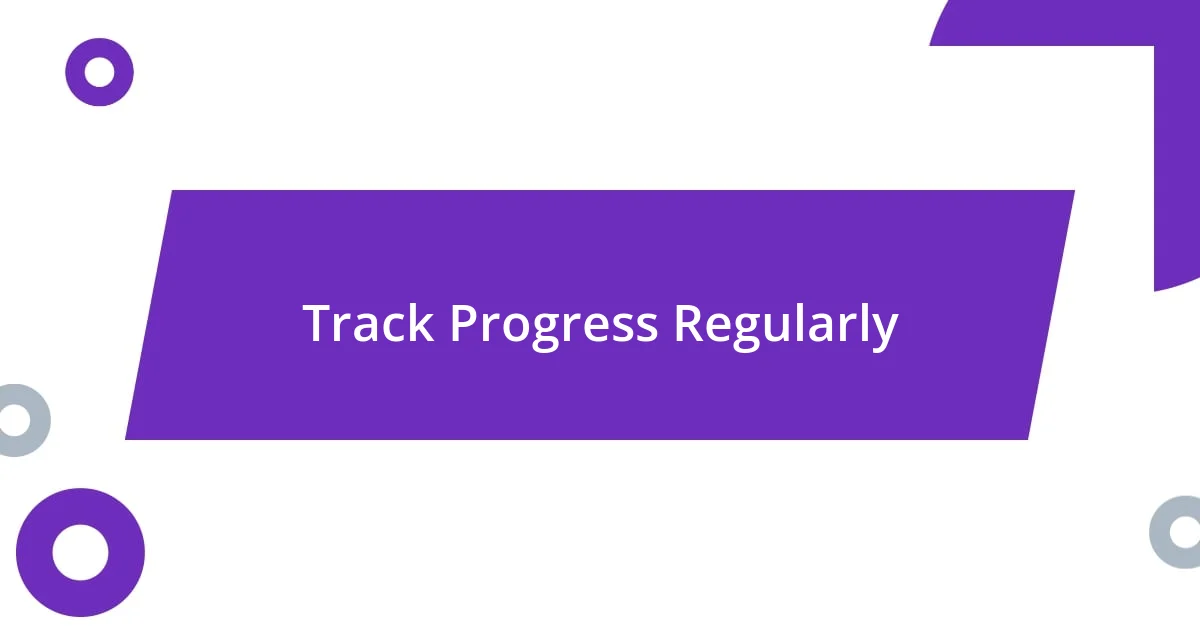
Track Progress Regularly
Tracking progress regularly is an essential aspect of achieving my learning goals. For example, I once embarked on a journey to master graphic design software. Initially, I felt overwhelmed by all the tools and techniques I needed to learn. To tackle this, I started documenting my progress weekly. This simple practice not only provided clarity but also revealed how far I had come, making the entire process feel rewarding. Don’t you find it motivating to see your own progress laid out in front of you?
As I tracked my progress, I discovered something crucial: reflection is key. After completing each task, I took a moment to evaluate what went well and what could be improved. This led me to refine my approach and adjust my goals as needed. For instance, I found that I struggled with color theory initially, so I dedicated extra time to focus on that area. That moment of honest self-assessment truly changed the way I approached learning. Have you ever taken the time to reflect on your progress? It can be a game-changer.
Using visual tools like charts or graphs has also enhanced my tracking experience. I once created a progress chart for a language learning app, where I plotted my daily practice streaks. Watching that graph grow served as a constant reminder of my dedication and commitment. It became a source of pride, pushing me to maintain my streak and, ultimately, to speak more confidently in conversations. I urge you to consider how you visualize your progress – it might add an exciting dimension to your learning journey.
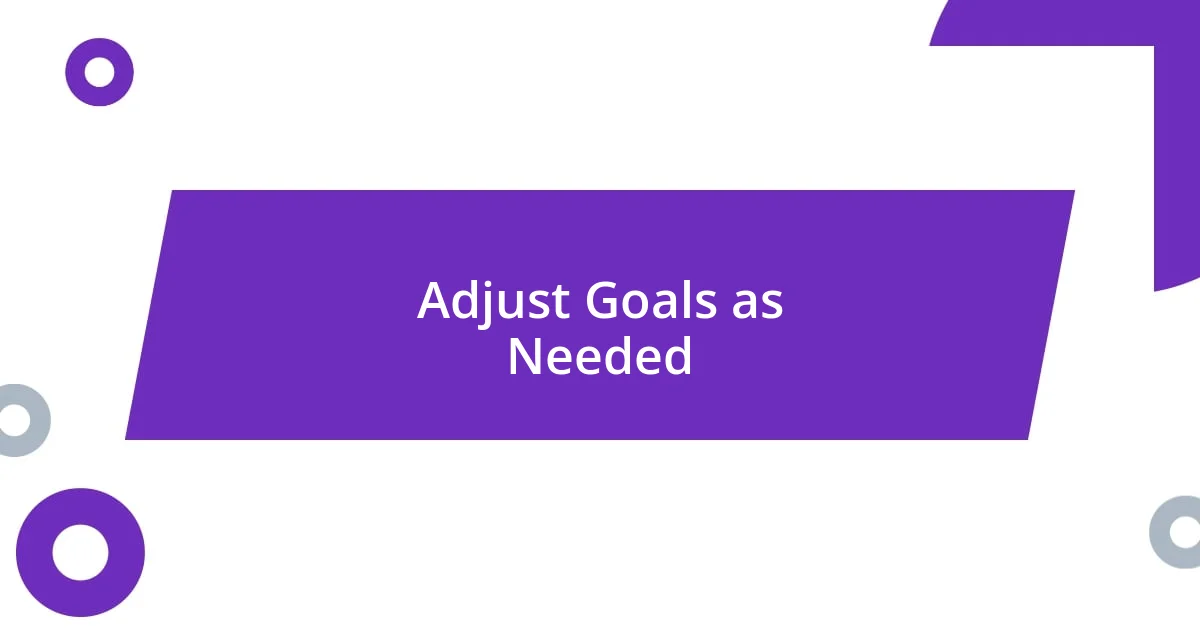
Adjust Goals as Needed
Adjusting goals as needed is vital in my learning journey. There were moments when I set ambitious targets, only to find them unrealistic as life unfolded. For example, I once aimed to master Python in just a couple of months but quickly realized that my initial pace was unsustainable due to other commitments. I had to reassess my timeline, and doing so allowed me to breathe easier and actually enjoy the learning process. Have you ever found yourself in a similar situation where you had to recalibrate your expectations?
Feedback can significantly inform our need to adjust our goals. When I started working with a mentor, she provided insights that shifted my focus entirely. I learned that my initial emphasis on theory overshadowed practical application. Realizing this, I altered my goals to include more hands-on projects, which not only made the learning experience more enjoyable but also proved much more effective. Isn’t it amazing how external perspectives can help clarify our paths?
Another lesson I’ve learned is to remain flexible when faced with challenges. I remember struggling with a particularly complex concept in my studies, and it began to frustrate me. Instead of persisting with my original target, I took a step back and allowed myself to spend more time on that area. As it turned out, this adjustment led to a deeper understanding, and I was eventually able to move on with confidence. Have you experienced that moment when stepping back opened new doors for learning? It’s a reminder that flexibility can often lead to breakthroughs.
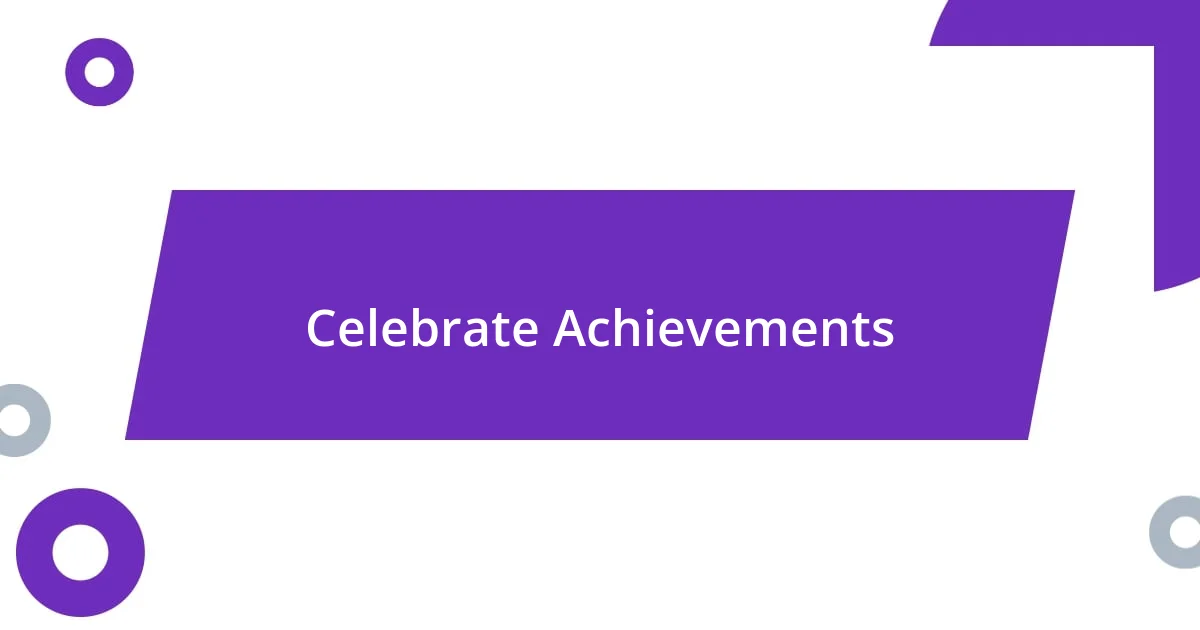
Celebrate Achievements
Celebrating achievements, no matter how small, is a practice I’ve found essential in my learning journey. Recently, after completing a tough online course in public speaking, I decided to treat myself to a nice dinner out. That experience underscored how rewarding it is to recognize my progress and growth, fueling my motivation for future challenges. Do you ever take a moment to celebrate your wins, or do you tend to rush on to the next task?
When I achieved my goal of delivering a presentation without excessive nerves, I felt a surge of pride and relief. To commemorate that moment, I created a small scrapbook documenting the journey—highlighting key accomplishments, feedback, and even some slip-ups along the way. Looking back at those pages brings a smile to my face, reminding me of how far I’ve come and the obstacles I’ve overcome. Isn’t it amazing how tangible reminders can keep our achievements alive in our minds?
What has truly resonated with me is the power of sharing successes with others. When I finished my last project, I not only celebrated privately but also shared my victory with friends and family. Their enthusiasm made the accomplishment feel even more special, deepening my sense of belonging in my community of learners. Have you considered involving others in your celebrations? Sharing your achievements might just amplify the joy!

